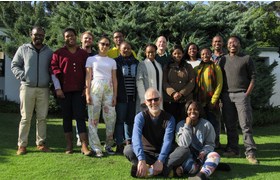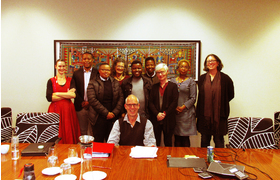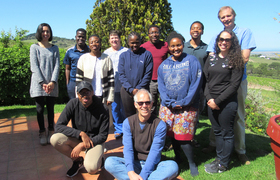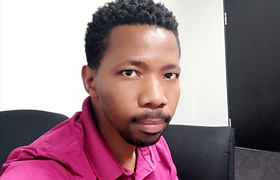nGAP congregates at Mont Fleur
03 May 2021 | Story Robert Morrell. Photo Ricardo Adams / Rob Muir. Read time 5 min.
It was the end of March 2021 and the country was in lockdown Level 1. Conferences and outdoor meetings were permitted, so the New Generation of Academics Programme (nGAP) enjoyed a writing retreat at the beautiful Mont Fleur in Stellenbosch.
It has been customary for members of nGAP to attend a writing retreat every quarter. Timetable clashes mean that not everybody can attend every time, but there is generally a good turnout, with mentors, supervisors and writing collaborators also invited.
This writing retreat welcomed three of the new nGAP (Phase 6) lecturers – Simon Chili, Tendani Chimboza and Pumelela Nqelenga – who were able to meet their nGAP colleagues for the first time.
The routine
The writing retreats follow a tried and tested format, which includes formal lunches and suppers, teas and lots of writing time in between. With particularly care around COVID-19, one can choose to work in alone in one’s room or in the communal area, where each work station has a divider and cleaning materials to reduce any risk of infection.
The routine also includes an early morning run for those so inclined. There is only one route at Mont Fleur – a steady downhill towards the Dornier wine estate and then a long tough uphill return. The routine also includes an afternoon walk. This is normally led by Michael Gallant, but on this occasion he was recovering from COVID-19. Ricardo Adams, another sterling member of the Mont Fleur staff who knows UCT academics very well, led the walk to Lourensford saddle.
Appreciation
The writing retreats have been part of the winning nGAP formula, and it is heartening to read the responses of those who attended and confirmed the value of the recipe:
- “It was my first time connecting face-to-face with ‘nGAPpers’. I felt a strong sense of community. Very much looking forward to the next retreat.”
- “It’s always such a nice refreshing experience to go to Mont Fleur; the space certainly motivates one to get a lot [more] done than in our normal spaces. I also appreciate the support we receive from Rob and Snazo – its beyond what words can explain. I find the peer support and chats over coffee/lunch to be super useful and very insightful. Thank you to nGAP for affording us such a space and the sense of belonging. A huge thank you, nGAP family.”
- “Excellent quiet space for clear thought and video recording. Got some research ideas and writing tricks from conversation with colleagues.”
- “I got time to focus on my research work and had fruitful conversations with Rob and learnt a lot from everyone.”
- “The writing retreats always help me to focus and buckle down. I can have a full day dedicated to work, without distractions. The writing retreats make me feel rejuvenated and motivated, so I am even able to achieve more when I return to the office. Furthermore, seeing all the other nGAP members is lovely – you really feel part of a larger group.”
- “I will always appreciate this time afforded to us to come together as a cohort and work in this serene environment and reconnect. Mont Fleur team always welcoming and providing best care to us in all ways possible, from great meals to warm rooms at night. Great time to meet the new members of the cohort and get to know each other.”
 This work is licensed under a Creative Commons Attribution-NoDerivatives 4.0 International License.
This work is licensed under a Creative Commons Attribution-NoDerivatives 4.0 International License.
Please view the republishing articles page for more information.
New Generation of Academics Programme (nGAP)
UCT has responded energetically to the New Generation of Academics Programme (nGAP), an opportunity provided by the Department of Higher Education (DHET) to build a new generation of black South African academics. The DHET’s 2015 vision document, “Staffing South Africa’s Universities Framework: A comprehensive, transformative approach to developing future generations of academics and building staff capacity”, proposes a suite of initiatives to address the challenge, with nGAP being the major instrument to increase the numbers of black South African academics.
The programme “involves the recruitment of highly capable scholars as new academics, against carefully designed and balanced equity considerations and in light of the disciplinary areas of greatest need”. The nGAP scholars are appointed into permanent positions where from the outset their conditions are customised to ensure their successful induction into the ranks of established academics.
The DHET provides funding over a six-year period to support the appointment of an nGAP lecturer, and their time is protected to provide the best possible opportunity for the completion of a doctorate degree in the shortest possible time. Once the degree is completed, the nGAP lecturer’s teaching commitments are steadily increased until they shoulder a full teaching load.
Since the first advertisement for nGAP posts in 2015, UCT has been awarded 17 nGAP positions: 5 (Phase 1), 4 (Phase 2), 3 (Phase 3) and 5 (Phase 4). These are distributed across all faculties.
UCT’s nGAP scholars operate as a single cohort, managed and coordinated by Dr Robert Morrell. Lecturers meet for quarterly meetings, writing retreats and various capacity-building activities all designed to support the completion of postgraduate qualifications (particularly doctorates) and to develop records of achievement that will testify to their emergence as self-standing, excellent academics. Each lecturer is mentored by a senior scholar, who provides support and guidance on the challenges that routinely face academics.
The nGAP manager sets great store in building the cohesion of the cohort and encouraging the establishment of new UCT networks while producing a collaborative, mutually supportive and embracing work culture.
According to Dr Morrell, “This group of academics will lead UCT in 15 to 20 years’ time ... Their vision of excellence, of being African and South African, of serving a wider community and producing knowledge for the planet, the continent and the country, will power UCT in years to come.”
Newsletters
In the news









































